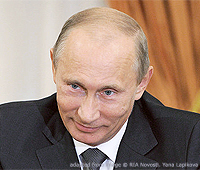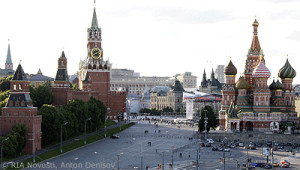Putin versus the NGOs

(opendemocracy.net – Pavel Chikov – July 3, 2014)
Pavel Chikov is chair of AGORA, an association of human rights organisations based in Kazan. Agora, founded in 2005, provides legal advocacy for victims of suspected human rights abuses, in particular for journalists, political activists and NGOs. Since 1999 Chikov has been a leading human rights lawyer and head of a number of Russian human rights organisations in Moscow and Kazan.
 The Kremlin is busy dismantling the institutions of civil society. How can NGOs develop, now that the rules have changed?
The Kremlin is busy dismantling the institutions of civil society. How can NGOs develop, now that the rules have changed?
Putin versus the NGOs
Recent developments in Russian laws concerning NGOs have led to much stricter rules for human rights activists. We remember the prosecutors’ mass inspections of NGOs, from last year, which are now being frantically intensified. Employees of NGOs are strongly convinced – not without some basis in fact – that the existence of laws concerning NGOs (including current ones) is down to the personal initiative of Vladimir Putin. His obstinacy on the subject is such that he ignores even rational arguments. Over the last two years dozens of debates with people of varying degrees of political influence and seriousness have been held, and were consistently ignored.
To a very large extent, the recent amendments to the law on NGOs – including those authored by Liberal Democratic Party Deputy Alexander Lugovoi, which compelled NGOs to be registered as ‘foreign agents’ – were a reaction to civil society initiatives. Despite the law, however, and despite prosecutors’ inspections of hundreds of NGOs, not one organisation registered itself as such with the Ministry of Justice. Lugovoi’s law was a move made out of desperation; an admission of the failure of a plan in which these organisations would do the government’s dirty work, and chain themselves up on its behalf. The Kremlin was seriously offended, and we know all too well how the President reacts to any challenges or threats. He reacts resolutely and becomes confrontational without a second thought.
GONGOs
This all fits in to a global context, in which civil societies are being built anew – and not from the bottom up. Legislative initiatives are being developed simultaneously to control not only NGOs, but also the mass media and internet. Having solidified the power vertical among bureaucrats and law enforcement, the Kremlin is attempting to do the same among journalists, bloggers, and activists. This is a paternalistic approach in the very purest sense. Nothing is allowed without the boss’s blessing.
This is all fairly obvious – even banal. For example, there is a proposed law on societal control, (which can never be accepted by us) designed to clarify which organisations can be controlled by the state. Given that its lobbyist, Iosif Diskin, is a member of the Civic Chamber of the Russian Federation, known for its pro-government positions, it is safe to assume that the idea for the law did not come to him from below. Diskin’s law would form a pyramid at whose summit would stand the very same Civic Chamber, which would then be responsible for accrediting NGOs. Only accredited NGOs would have the right to scrutinise the state’s activities; however, a third of the Civic Chamber’s members are nominated by the President; and the remaining members were elected this year using a system of online voting. Given the numerous instances of electoral fraud, this was a scandalous misuse of administrative resources. As a result, a large number of conformists have appeared in the Civic Chamber. It is these people who will decide how society will and should control the state.
At the same time, the Kremlin is developing GONGOs (government-sponsored NGOs) in parallel. This is in part due to new laws, which compel NGOs to refuse grants from abroad, so as to avoid being branded as ‘foreign agents.’ In the minds of Kremlin bureaucrats, the non-commercial sector should control/scrutinise the state while yet being fully dependent on it. But, as we know, the Kremlin is all too often out of touch with reality.
Keep your opinions to yourself
It is important to remember that Putin began to toy with the idea of prohibiting foreign funding for NGOs as long ago as 2003. That year, he first voiced the idea publically, and mentioned it again in 2004 in his address to the Federal Assembly. As the rosy years of Medvedev’s Presidency began in 2008, these discussions died down.
For the next four years, there was no real pressure on NGOs; until 2012. In that year, new laws concerning NGOs were passed, first introducing the term ‘foreign agent,’ and thereby setting the wheels of the propaganda machine in motion. It was an important moment. Over the past two years, the Kremlin has been very active in using propaganda to re-educate public opinion against NGOs, while simultaneously increasing pressure on online media (which is one of only a few sources of alternative independent news). To have anything other than a pro-povernment view equates to political activity. This is one of the key points inherent in all the laws on NGOs; and concerns human rights activists, bloggers and journalists. One must not forget, also, that recent initiatives in the field of media law contribute towards an increasingly hostile media environment – not to mention how the application of the term ‘foreign agent’ to media publications is still widely used.
Roughly speaking, legislation since 2012 has become more restrictive towards dissenters. If you are against government policy, you are to be singled out for special treatment: your inclusion on a blacklist, and an investigative film all about you, to be shown on state television.
But has it worked?
But has it worked, this restrictive legislation? It cannot be said that the Kremlin’s efforts have led to nothing, but the situation as it stands today is clearly not what they had hoped to achieve. In 2003, they would never have imagined that their issues with civil society would not be solved some eleven years on. The system of foreign funding for NGOs has changed, but it exists nonetheless. New foreign donors are emerging, founding new organisations in turn.
Let us examine Agora, which my colleagues and I founded in 2005. From the very beginning, our working environment has never, even for one day, been fully comfortable. In spite of the steadily deteriorating situation around us, however, we have managed to actively develop as an organisation. Though many NGOs have long since stopped their activities, there are plenty of newcomers – and they are able to adapt. One recent trend is the refusal outright, of many NGOs to register; and survive… This organisational (and legal method), of course, now faces many problems, but it does demonstrate that NGOs can exist effectively as social movements – entirely without registration.
The new rules of the game
To try and predict anything in Russia is a pointless endeavour. On the other hand, it can be said that attempts by the Kremlin to forbid individual cases of civic engagement will be very, very difficult to realise. In this case, social activism will not disappear entirely.
We are already being frequently compared with Belarus, a tightly controlled country, which also has its human rights and civic activists. However, we see the situation as being similar to that which has emerged in Myanmar, where human rights defenders are classified as criminals. But even in these conditions they can still work; they attend events abroad, reporting on violations of human rights in their home countries – all the while asking not to be photographed so that they can continue their work. In the USSR, we should remember, there were still advocates and defenders of human rights. Even Yuri Schmidt, the Leningrad lawyer who defended dissidents in court, and hid his advocacy from nobody, did not print samizdat [the printing of censored material]. He operated through official channels using the professional means available to him.
How far the Kremlin will actually go in its battle against NGOs is a big question. We now hear comparisons of Russia not only with Belarus, but also with China and North Korea. We may well be moving in that direction, yet we also understand how far we are from these comparisons becoming reality. Only the security services can adapt quickly to such situations; for they are the apparatus of repression. For them, the matter is a simple one – the more power they hold, the more comfortable their positions; in contrast. for human rights activists to adapt will be much harder and take much longer. Yet eventually, I believe, we will succeed.
Article also appeared at http://www.opendemocracy.net/od-russia/pavel-chikov/putin-versus-ngos bearing the following notice:
 This article is published under a Creative Commons Attribution-NonCommercial 3.0 licence. If you have any queries about republishing please contact us. Please check individual images for licensing details.
This article is published under a Creative Commons Attribution-NonCommercial 3.0 licence. If you have any queries about republishing please contact us. Please check individual images for licensing details.
